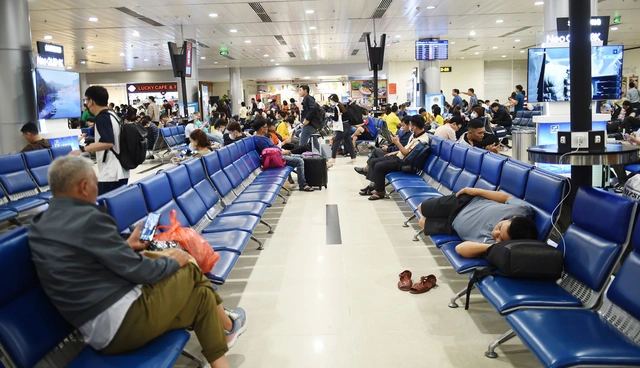
Passengers at an airport in Vietnam. Photo: Tu Trung / Tuoi Tre
In public spaces meant to be quiet, some people continue to talk on their phones at full volume, even using speaker mode, disrupting the shared environment and leaving others frustrated.
During a recent check-up at a hospital in Ho Chi Minh City, I arrived early at around 6:00 am and sat in the waiting area, which quickly filled with other patients.
While most people spoke quietly or even covered their mouths when on the phone, one woman stood out.
She spoke loudly, seemingly unaware or unconcerned about her surroundings.
Using a speakerphone, she broadcast her conversation to the entire room: "I went early to the hospital and still got number 152. Who knows when I can see a doctor? I’ll probably get the medicine around noon. Don’t forget to cook for your father!"
The disturbance was obvious.
People stared, visibly annoyed.
In a place like a hospital, where silence is often needed, such behavior felt particularly disrespectful.
In big and bustling cities like Ho Chi Minh City, public noise is already exhausting.
Quiet spaces are rare, yet many treat cafés, buses, train stations, or even airport lounges as private zones for loud personal calls.
Some passengers on public buses hold long, dramatic phone conversations that everyone ends up hearing, with topics ranging from romantic quarrels to workplace drama or drunken disputes from the night before.
While everyone has the right to communicate, excessively loud conversations intrude on others' peace.
These disruptions are not just a personal issue. They reflect broader questions about public behavior, cultural norms, and mutual respect in shared spaces.
Perhaps some people simply have not developed the habit of adjusting their volume depending on the setting.
Others may see loud talking as a way to command attention or express emotion, whether excitement or stress.
In certain regions, speaking loudly is even seen as a sign of friendliness or warmth.
Of course, not everyone who talks loudly in public is trying to disturb others.
Sometimes it is unintentional like a natural response when overwhelmed or anxious.
These people may deserve understanding rather than judgment.
But regardless of intention, the result is the same: talking loudly in public invades others’ space, disrupts the atmosphere, and can even affect the mental comfort of those nearby.
To cope with this behavior, a simple look of disapproval or a polite reminder might help, but such actions also risk escalating into confrontation or even physical altercations in some cases.
Some argued that it is just a minor nuisance and we should tolerate it.
But others stressed the importance of preserving quiet in public spaces.
The answer may lie in respectful reminders and a collective commitment to more thoughtful behavior.
Ultimately, dealing with public loud talkers depends on how each person chooses to respond.
But for those with the habit, the solution is clear: adjust your volume, respect shared spaces, and remember you are not alone.




Max: 1500 characters
There are no comments yet. Be the first to comment.